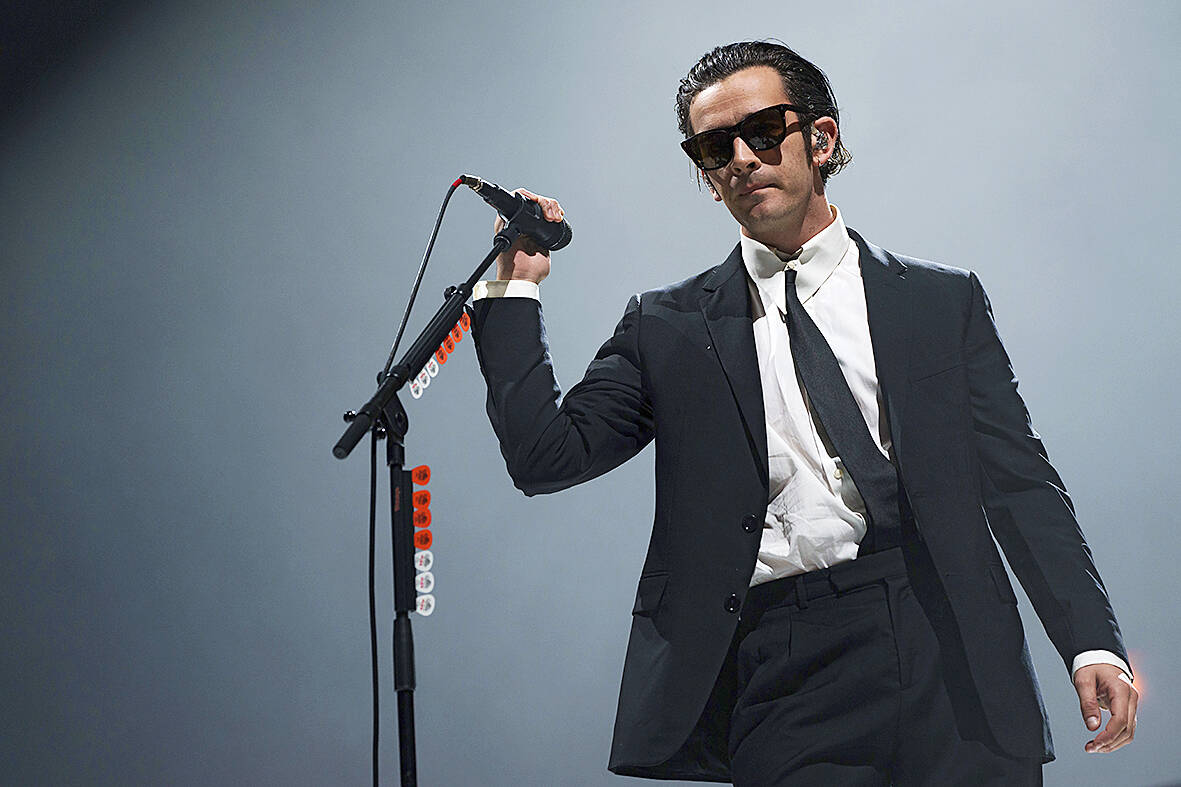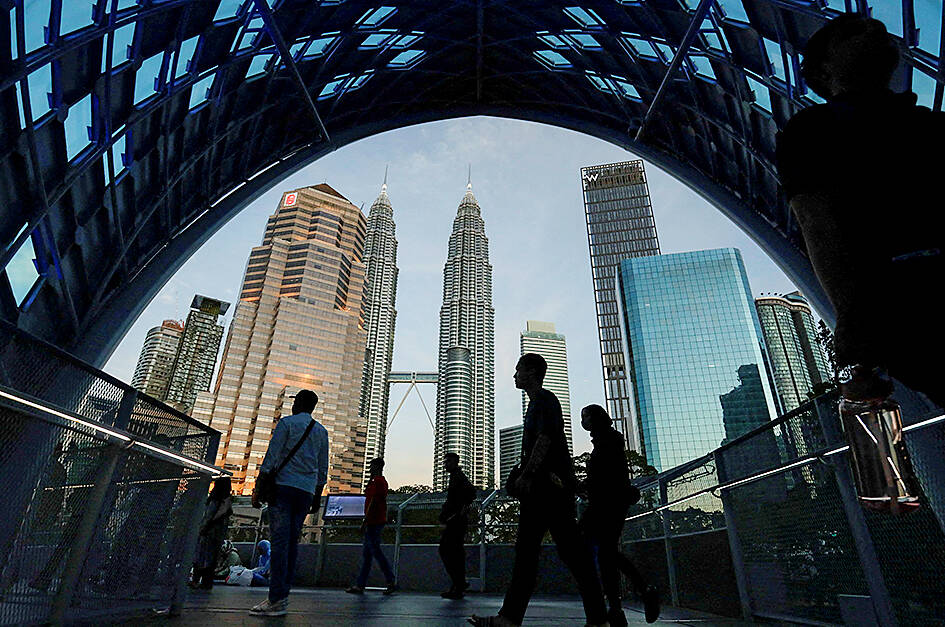The 1975 frontman Matty Healy’s recent appearance at a festival in Kuala Lumpur — where he criticized Malaysia’s homophobic laws and kissed a male bandmate on stage — has strongly angered conservatives in the country.
Members of the LGBTQ+ community have also expressed unease over his actions, fearing that the episode risks further exacerbating the hostilities they face.
“He gets to fly out of the country and not face the consequences, while our people have to face the brunt of what just happened,” said drag performer Carmen Rose, who described the speech as self-serving, adding that it risked undoing the work of activists.

Photo: AP
The British pop-rock singer was headlining the Good Vibes festival when he criticized the country’s homophobic laws in a profanity-laden speech . He was holding what appeared to be a wine bottle and spat on the stage as he spoke.
He said: “Unfortunately you don’t get a set of loads of uplifting songs because I’m fucking furious. And that’s not fair on you, because you’re not representative of your government. Because you’re young people, and I’m sure a lot of you are gay and progressive and cool.”
The comment was met with some cheers from the audience.

Photo : Reuters
Healy then kissed the bass player Ross MacDonald as they played the song I Like America & America Likes Me. About 30 minutes later the band walked off stage, with Healy announcing they were now banned.
The following day, organizers of the festival announced that the entire weekend event had been canceled. The government has also said it will tighten entry requirements for foreign artists to perform in Malaysia, according to local media.
FREEDOM OF SPEECH
Dhia Rezki Rohaizad, the deputy president of Jejaka, a social support group for gay, bisexual and queer men in Malaysia, criticized the government’s handling of the situation, citing Healy’s right to freedom of expression.
But he added that Healy’s speech was not how many activists in the country would have wanted to highlight the issue. “We’ve been doing a lot of work on the ground, community organizing, and having stakeholder meetings with local government agencies,” he said. “Doing it at this scale, with a lot of people who are not aware of the discussions going around with regards to queer activism, that is what is harmful.”
Malaysia’s federal penal code, first introduced during British colonial rule, punishes oral and anal sex with up to 20 years in prison.
Each state and the federal territories of Kuala Lumpur and Putrajaya also have sharia codes that generally criminalize gay sex and gender nonconformity.
Activists have warned of increased intolerance over recent years, citing in particular a raid on an LGBTQ+ Halloween party in Kuala Lumpur last year, when 20 people were arrested.
“For people who live in Kuala Lumpur, the raid was a very scary night and I think that since then a lot of us do live in fear,” said Mikhail Hanafi, a member of the LGBTQ+ community. “In a lot of other places in the world, queer nightlife is one of the places where at least a subset of queer people can feel safe and a sense of community.”
MORE HARM THAN GOOD?
This was no longer the case in Malaysia, Hanafi said, adding that when the lights came on in a club at the end of the night, some friends immediately felt a sense of panic, fearing that this was the sign of another police raid.
There was value in foreign performers speaking out, said Hanafi. But he added: “They need to be mindful of how they speak. They need to speak to the community beforehand.”
Activists are especially concerned that Healy’s comments come just weeks before state elections. Campaigning often coincided with a rise in hate speech, said Thilaga Sulathireh, a founder of the group Justice for Sisters, which advocates for LGBTQ+ rights.
On Monday, the national human rights commission of Malaysia said that while it “advocates equality for all and freedom of expression, it is important to stress that these rights must be practiced responsibly and within any restrictions imposed by local laws and cultural considerations.”
Sulathireh said the statement illustrated why LGBTQ+ communities felt nervous. “It is really a testament to the protection that LGBT people have in Malaysia. Of course, folks are going to be concerned — if anything were to happen to them they feel completely unprotected.”
Carmen Rose says she is not able to advertise performances in Kuala Lumpur, due to pressure on the community. “Any foreign artist who comes here and who wants to advocate for us, they need to understand how to go about it,” she said. “What works in the west may not work here. They may actually do more harm than good.”

That US assistance was a model for Taiwan’s spectacular development success was early recognized by policymakers and analysts. In a report to the US Congress for the fiscal year 1962, former President John F. Kennedy noted Taiwan’s “rapid economic growth,” was “producing a substantial net gain in living.” Kennedy had a stake in Taiwan’s achievements and the US’ official development assistance (ODA) in general: In September 1961, his entreaty to make the 1960s a “decade of development,” and an accompanying proposal for dedicated legislation to this end, had been formalized by congressional passage of the Foreign Assistance Act. Two

Despite the intense sunshine, we were hardly breaking a sweat as we cruised along the flat, dedicated bike lane, well protected from the heat by a canopy of trees. The electric assist on the bikes likely made a difference, too. Far removed from the bustle and noise of the Taichung traffic, we admired the serene rural scenery, making our way over rivers, alongside rice paddies and through pear orchards. Our route for the day covered two bike paths that connect in Fengyuan District (豐原) and are best done together. The Hou-Feng Bike Path (后豐鐵馬道) runs southward from Houli District (后里) while the

March 31 to April 6 On May 13, 1950, National Taiwan University Hospital otolaryngologist Su You-peng (蘇友鵬) was summoned to the director’s office. He thought someone had complained about him practicing the violin at night, but when he entered the room, he knew something was terribly wrong. He saw several burly men who appeared to be government secret agents, and three other resident doctors: internist Hsu Chiang (許強), dermatologist Hu Pao-chen (胡寶珍) and ophthalmologist Hu Hsin-lin (胡鑫麟). They were handcuffed, herded onto two jeeps and taken to the Secrecy Bureau (保密局) for questioning. Su was still in his doctor’s robes at

Mirror mirror on the wall, what’s the fairest Disney live-action remake of them all? Wait, mirror. Hold on a second. Maybe choosing from the likes of Alice in Wonderland (2010), Mulan (2020) and The Lion King (2019) isn’t such a good idea. Mirror, on second thought, what’s on Netflix? Even the most devoted fans would have to acknowledge that these have not been the most illustrious illustrations of Disney magic. At their best (Pete’s Dragon? Cinderella?) they breathe life into old classics that could use a little updating. At their worst, well, blue Will Smith. Given the rapacious rate of remakes in modern